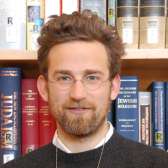
"The Mauthausen War Crimes Trial and American Justice in Germany"
Professional Background
Tomaz Jardim recently received his Ph.D. in history at the University of Toronto in Canada where he also received a Masters degree in history. For his Laurie and Andy Okun Fellowship, Dr. Jardim conducted research for his project, “The Mauthausen War Crimes Trial and American Justice in Germany.”
Dr. Jardim is the author of two articles: “Die ersten Erhebungen von Nazi-Kreigsverbrechen in Mauthausen: Amerikanische Ermittler und die Befreiung des KZ,” [First Assessments of Nazi War Crimes at Mauthausen: American Investigators and the Liberation of the Concentration Camp] in 2008 Jahrbuch des KZ-Gedenkstätte Mauthausen (Vienna: Austrian Ministry of the Interior) and “Early Assessments of Nazi Criminality: The American Investigation of War Crimes at Mauthausen, 1945” in editors Christiane Hess et al., Continuities and Discontinuities in the Historical Development and Reception of the Concentration Camps (Forthcoming, 2010). He is the recipient of several fellowships and awards for his research, including the Diane and Howard Wohl Fellowship from the Center for Advanced Holocaust Studies, United States Holocaust Memorial Museum; an Ontario Graduate Scholarship; a Language Study Scholarship from the Deutscher Akademischer Austausch Dienst (DAAD); and the Bagnany Award for Excellence in the Field of History, Trent University. In 2009, Dr. Jardim was Visiting Assistant Professor of Modern European and Holocaust History at Pacific Lutheran University. He has also worked as a fact checker and abstract writer for Holocaust memoirs submitted for publication to the Azrieli Foundation. Dr. Jardim is fluent in German, and has lectured and presented at several conferences on Holocaust-related topics.
Fellowship Research
During his tenure at the Center, Dr. Jardim finalized the research for his manuscript on the 1946 Mauthausen War Crimes Trial. Despite the fact that more than sixty perpetrators from one of the most notorious Nazi concentration camps were brought to trial, the trial has remained virtually absent from the historiography of the Holocaust. Dr. Jardim assessed the role of the Mauthausen Trial in the war crimes process. He addressed the issues of the controversial “parent trial system” as well as the concept of a “common design to commit war crimes,” both of which were employed by the American Army in order to prosecute hundreds of perpetrators in the shortest period of time the law would allow. Dr. Jardim explored the contemporary perceptions of Nazi criminality that the trial reveals and assessed the role of the Mauthausen Trial in shaping the historical memory of the Holocaust. He used the Museum’s oral history collection as well as the Mauthausen trial documentation located at the U.S. National Archives and Records Administration.
Dr. Jardim was in residence at the Mandel Center from February 1 to June 30, 2010.
